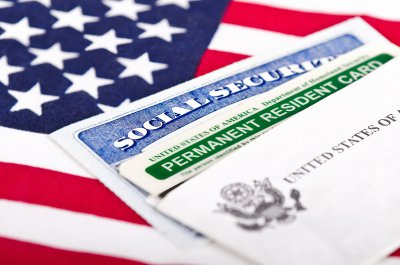
Prior to 1990, there was a much clearer distinction between immigrant and non-immigrants under the law. However, when Congress enacted the Immigration Act of 1990, it made a total mess of the system. One path to chaos was to allow H-1B and L non-immigrants to apply for permanent residency.
This was rationalized with the Orwellian concept of "dual intent", wherein a foreigner applying for a non-immigrant (i.e. temporary) visa could be considered to simultaneously intend to return home and intend to remain the U.S.
This change had a number of entirely predictable effects. First, it transformed green cards into a publicly provided fringe benefit for employers to induce aliens to become guestworkers.
Second, it turned the labor certification process for “green cards” into a total joke. H-1B and L visas do not require the employer to show an American is not available for a job but green cards do. Under the dual intent system, employers have already filled the position with a guestworker before they make the green card petition. They have to find a way to reject all Americans who apply for the job. Otherwise, they would not be able to attract guestworkers with the promise of a green card.
Third, it created backlogs. Allowing a guestworker visa program to flow into a green cards program with stricter requirements and limits is like having a 4 inch sewer pipe flow into a one inch sewer pipe.
The backlog problem was exacerbated by Indian interests taking over the H-1B program early on and developing a virtual monopoly over the program. Congress decided long ago to foster national-origin diversity in the immigration flow by limiting any one country to a maximum of 7 percent of green cards each year (with exceptions for certain categories) – but India gets about 80 percent of H-1B visas. By 2000, the green card backlog for India had reached the six-year duration of an H-1B visa.
So Congress doubled down on its 1990 mistake by allowing H-1B workers to remain in that status indefinitely once they got into the green card queue. The entirely predictable result was even bigger green card backlogs. The backlog for India is now decades long. Anyone from India who applies for an employment-based green card has no realistic chance of ever getting one.
So the backlogged foreign workers hired lobbyists to change the system. Now Congress is prepared to triple down on its 1990 mistake with the overly racialist and grossly misnamed Fairness for High Skilled Immigrants Act (H.R. 1044). The House of Representatives is set to vote on the bill tomorrow.
This bill would remove the per-country limits on employment-based green cards. It would have a number of entirely predictable effects.
The green card backlog problem is overblown. It only affects a few countries that supply large numbers of H-1B workers. Right now, unless you are from one those countries, you can come to the United States directly on green card. If the “Fairness” bill is enacted, as a practical matter everyone will have to get an H-1B visa before getting an employment-based green card. Among other things, that means more work for immigration lawyers. Plus employers would be able to force all potential immigrants to endure a period in which they are bound to them.
Because India gets about 80 percent of the H-1B visas, India would get 80 percent of the green cards in those categories. Thus Congress is on the verge of replacing our policy of national-origins diversity with an "India First" immigration policy. This illustrates why foreign money and foreign on-the-ground lobbying has been driving the bill.
Because the only way to wait out the green card queue will be to get an H-1B visa first, those in occupations not eligible for H-1B will no longer be able to get employment-based green cards.
Thus, we have the Congress on the verge of turning the legal immigration system into as big a mess in its own way as we have at the Southern border. Imagine the screams when industries outside of high tech (which dominates H-1B) discover they can no longer get green cards for their foreign workers. Imagine the screams of nearly every ethnic group in the country when they discover their compatriots can no longer get employment-based green cards.
This bill calls into question the basic competence of Congress. Few people in Congress have thought through the implications of the bill. There have been no hearings on the Fairness for High Skilled Immigrants Act. There have been no debates. Yet the Democratic House leadership has scheduled a vote for this week.
The solution to the highly limited green card backlog problem is simple: end dual intent for non-immigrant visas and the problem goes away. Force employers to choose up front whether they are hiring an immigrant or a guestworker. That way the foreign workers know when they arrive whether they will be able to stay or whether they will have to return home.
